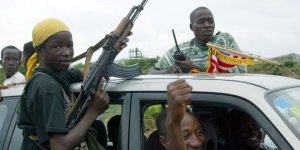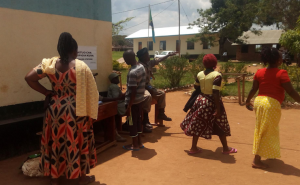Liberia: Ellen Reflects On Battle Against Ebola-Launches Book Documenting Liberia’s Resilience

Monrovia — Former President Sirleaf launches a book on Liberia’s fight against Ebola, as she reflects on resilience of the population here.
The Ebola outbreak here left an enduring psychological and spiritual scar on the people of Liberia. It is a deep wound, a painful memory that will not fade.
At the official launch of a book titled: Stepping Up To The Plate: Liberia’s Untold Ebola Story, former President Ellen Johnson Sirleaf recalled the early days of the pandemic, when Liberians crossing into northern Lofa County from neighboring Guinea began showing signs of a mysterious and deadly illness.
“We didn’t know what it was. We had never experienced an infectious disease of such intensity,” Madam Sirleaf recounts, noting “Our immediate response was to stop movement because the disease was spreading rapidly, and people were dying along the way.”
Sirleaf tells her audience here that the government implemented a militant approach to contain the outbreak, urging citizens to remain in place and seek treatment. Despite World Health Organization (WHO) projections that one million people could die, Liberia mobilized its resources and experts, including Dr. Jerry Brown, the late Dr. Walter T. Gwenigale, and Dr. Phillip Ireland, to fight the epidemic.
She also acknowledges Dr. Tolbert Nyenswah, former Incident Manager of Liberia’s Ebola response, who has authored “The Untold Story of Ebola”.
The former President continues that Liberia’s united response, with churches, business community, students, and communities rallying under one strategy and one plan, proved critical.
“We didn’t want international institutions dictating our priorities. Whatever they did had to align with our strategy, and because of that unity, we got results,” she expresses with pride. “When we responded, we put decisions in the hands of the community health workers, and they delivered”, adding that “We also did that with COVID-19.”
Speaking at the launch, Ambassador-at-Large Madam Ora Richards, representing President Joseph Nyuma Boakai, praises Liberians’ resilience and calls for nationwide awareness and distribution of the book.
“We’ve come a long way. Liberians are resilient, determined, hardworking, and progressive. We can achieve anything with the right leadership,” Madam Richards says. She suggests that the book should be translated into local dialects and disseminated to communities. “We need to tell our own story, because if we don’t, others will, and not in our best interest”, she encourages Liberiams.
The book is an initiative of the Liberia Institute for Growing Patriotism (LIGP) and the Angie Brooks International Centre for Women’s Empowerment, Leadership Development, International Peace & Security.
The event, held on April 10, 2025, at the National Museum in Monrovia, brought together distinguished guests, present and former government officials, international partners, diplomats, and students. It featured speeches and candle lighting to symbolize unity and solidarity in the fight against Ebola.
Earlier, Information Minister Jeremiah Mathew Piah, welcomed attendees, describing the book as more than a publication, rather he said it is a record of survival through one of Liberia’s darkest periods. He praised LIGP and ABIC for recording the resilience of the people of Liberia.
In her address, the Executive Director of LIGP and Board Chair of ABIC, Olubanke King-Akerele, highlighted former President Sirleaf’s global mobilization efforts during the crisis, engaging the U.S., EU, China, the UN, ECOWAS, and others. She proposed that the National Public Health Institute of Liberia (NPHIL) should establish a memorial garden to honor those who lost their lives to Ebola.
“Fifty percent of proceeds from this book will support this effort,” she announced, calling for national support. “This is the genesis of the book, Liberians telling their own story, what they did, and how they survived.”
Cllr. Yvette Chesson-Wureh, Establishment Coordinator of ABIC, shared the center’s role during the crisis. As a member of the Presidential Ebola Task Force, ABIC’s youth teams conducted door-to-door awareness campaigns, educated communities on equipment use. ABIC served as mediators between the government and local populations.
Ebola first broke out in Liberia in March 2014. At the time, the country had only 50 doctors, roughly one for every 70,000 people. By October 2014, all 15 counties had reported cases. In January 2015, the number of cases began to decline. Liberia was declared Ebola-free in May 2015, though brief resurgences occurred in June and July. The country was finally declared Ebola-free again in January 2016.
In total, 10,666 Liberians were infected and 4,806 lost their lives. Across Liberia, Guinea, and Sierra Leone, US$53 billion was committed to the Ebola response.
The newly launched book, Stepping Up To the Plate: Liberia’s Untold Ebola Story, stands as a testament to the resilience, courage, and patriotism that defined Liberia’s battle against one of the deadliest outbreaks in modern history. Editing by Jonathan Browne
By New Dawn.



